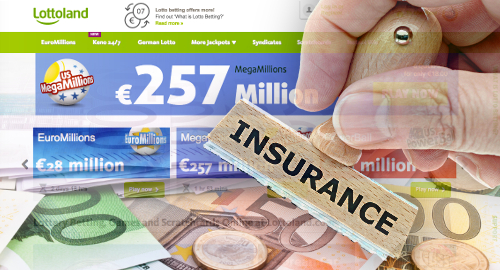 Lottery betting operator Lottoland has taken out a record insurance policy to guard against the possibility of a punter winning a nine-figure jackpot.
Lottery betting operator Lottoland has taken out a record insurance policy to guard against the possibility of a punter winning a nine-figure jackpot.
This week, Lottoland announced that it had revised its risk management system to prepare for the likelihood and/or eventuality of one of its customers betting correctly on a truly staggering EuroMillions, PowerBall or other major lottery jackpot.
Lottoland declined to identify the insurers but would say it’s now carrying €120m worth of Insurance Linked Security coverage. The company also claimed the sum represented the largest reinsurance deal in the gaming industry. This is Lottoland’s third such deal since 2015, with early renegotiation triggered by the company’s rapid growth.
Lottoland allows punters to participate in lotteries to which they may not have access in their home territory. Lottoland customers essentially place a wager on the outcome of a lottery drawing, giving them the ability to claim the identically valued prize on offer from the lottery in question.
To date, Lottoland’s single biggest payout was a €22m winning bet placed by a German customer last year. Collectively, Lottoland has paid out a total of €838m to its customers since it launched operations in 2013. In June, Lottoland announced that it had served its six millionth customer.
Lottoland revels in its ‘disruptive’ approach to what has often been dismissed as a staid and hidebound industry. This has ruffled feathers among traditional lottery operators such as Camelot, which has accused Lottoland’s business model of cutting into the share of lottery revenue that Camelot steers toward charitable causes.
Camelot’s public protestations may have played a role in the UK government’s decision in March to open a consultation into prohibiting third-party betting on EuroMillions draws. It may have also contributed to the complaints that led the UK Gambling Commission to impose a £150k penalty on Lottoland in June for using “ambiguous terminology” in its marketing that confused customers as to whether they were participating in an actual lottery draw.
Lottoland CEO Nigel Birrell recently told the Mail’s This Is Money that the UK government would be better served studying the company’s alleged impact on money raised for charitable causes before taking steps to restrict Lottoland’s operations “as a kneejerk reaction based on what the monopoly operator wants.”
Birrell likened his company to “the hair on the pimple on the cow’s backside” in terms of its ability to negatively impact Camelot’s sales. Birrell said Camelot’s sales were down because they’d made lottery jackpots harder to win and that Lottoland had become “a bit of a scapegoat for the problems [Camelot are] having within their own organization.”
While Lottoland continues to expand its reach into new markets via B2B deals with online gambling operators like Kindred Group and William Hill Australia, the company is also facing competition from copycat lottery betting operators. Birrell says he views this as the sincerest form of flattery, and besides: “I welcome competition from new entrants rather than people hiding behind a monopoly.”